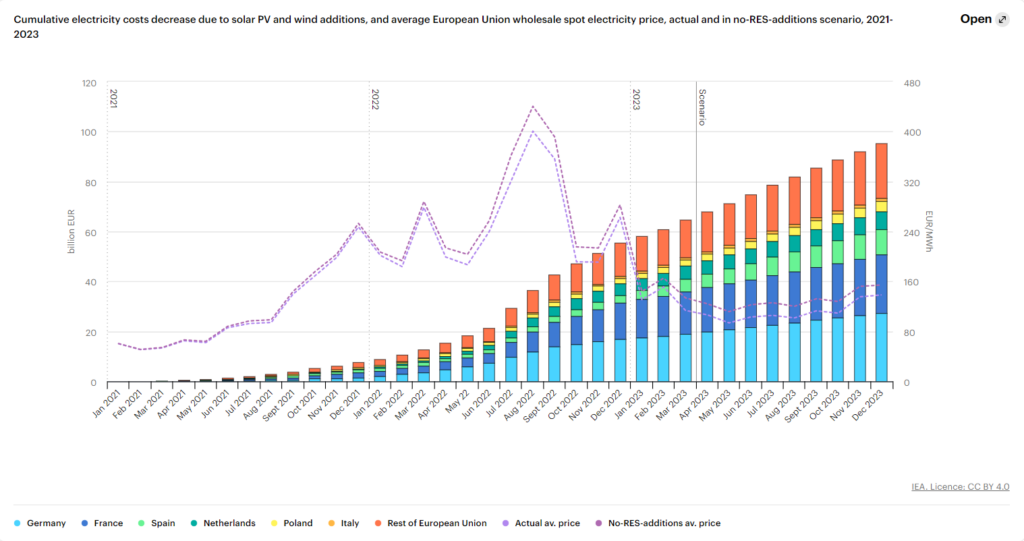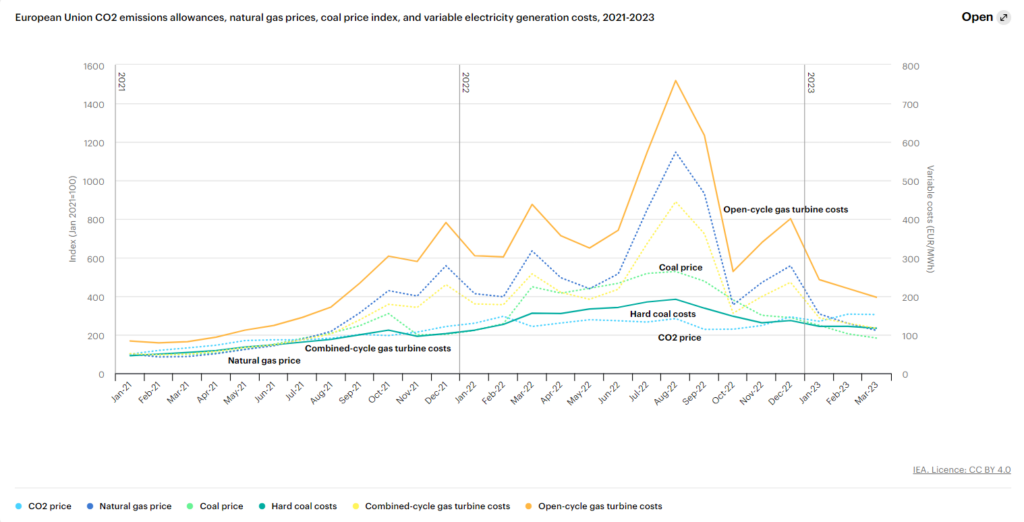The International Energy Agency (IEA) has announced how much savings can be achieved in electricity production by using renewable energy sources across the European Union (EU). [1] The IEA has determined that consumers in the bloc will save an estimated 100 billion euros during the period of 2021-2023 due to newly established wind and solar energy production The attack by Russia on Ukraine has had a significant impact on the EU’s energy supply and prices. However, renewable energy sources have prevented this impact from increasing further.
According to the IEA, if there were no new renewable energy projects, the average wholesale electricity price would have been 8% higher in 2022. There has been an 80% decrease in natural gas supply to the EU through Russia’s pipeline between 2021 and 2022. Along with the recent declines in hydroelectric and nuclear energy production in Europe, this situation has led to an increase in the types of coal and natural gas used in energy production. [2]
Between January 2021 and August 2022, the average monthly natural gas price increased tenfold, while coal prices increased fivefold. As a result, electricity prices in Europe have risen 15-20 times higher than the average between 2015-2020. Without solar and wind energy projects as alternatives to fossil fuels during the period of 2021-2023, these price increases would have been even more severe. Average wholesale electricity prices were approximately 3% higher in 2021 and 8% higher in 2022. It is anticipated that they will be 15% higher in 2023. This means an increase of around 100 billion euros in electricity supply costs for the entire EU. [3]
Figure 1. Decreasing Trend in Electricity Prices in the EU as a Result of Renewable Energy Usage [4]

According to Figure 1, there was a sharp downward trend in electricity prices in December 2022. This decline continued until February 2023. After a slight increase in February 2023, there was a fluctuating downward trend. Electricity prices have been on a declining trend since December 2022.
The 2023 report by the World Economic Forum and Accenture on Promoting Effective Energy Transformation draws attention not only to the progress made in energy transition but also to the ongoing challenges. [i] The Forum acknowledges “broad progress in clean and sustainable energy,” but it notes difficulties in the equality of this transition The report highlights price shocks that have affected low-income countries the most due to recent macroeconomic and geopolitical developments, including increases in fuel prices, food inflation, and rising debt burdens.[ii]
The report emphasizes the importance of investment and suggests that policies and partnerships can help manage this transition. Measures such as the EU’s Carbon Border Adjustment Mechanism, which helps increase technological development and clean energy supply, and the United States’ Inflation Reduction Act are among the initiatives mentioned. [iii]
Figure 2. Increasing Trend in Electricity Production Costs in the EU in 2022[iv]

In Figure 2, the electricity production costs incurred between January 2021 and March 2023 are presented. Significant fluctuations in electricity production costs were experienced in 2022. However, in 2023, there was a decrease in electricity production costs (excluding carbon pricing and coal costs).
Although substantial progress has been made in clean and sustainable energy in the EU, there are challenges regarding the equity of this transition. Increases in fuel prices, food inflation, and rising debt burdens negatively impact low-income countries
As a result of recent macroeconomic and geopolitical developments, price shocks are occurring. Due to these reasons, low-income countries do not have the same equal opportunities as other countries in transitioning to clean and sustainable energy.
[1] “This is How Much Money Renewable Energy is Saving Europeans”, Weforum, https://www.weforum.org/agenda/2023/09/renewable-energy-europe-gas-coal-energy-transition/, (Erişim Tarihi: 12.09.2023).
[2] Aynı yer.
[3] Aynı yer.
[4] Same place
[5] Aynı yer.
[6] Aynı yer.
[7] Aynı yer.
[8] Aynı yer.






